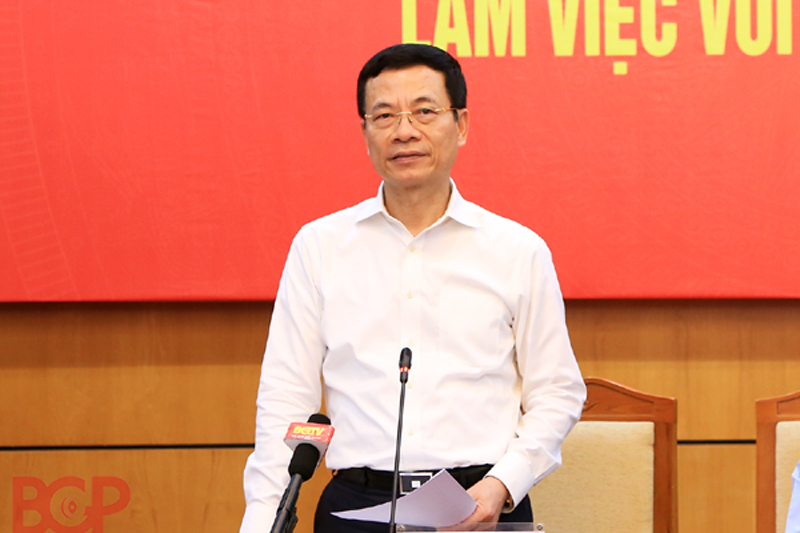This was the message given by Minister of Information and Communications Nguyen Manh Hung at a recent meeting with officials of Bac Giang Province. VietNamNet would like to present the full text of his speech:
 |
| Minister of Information and Communications Nguyen Manh Hung. Photo: Bac Giang News |
The common logic is that if we are weak, we will go behind others. If so, we will always be latecomers. So, the right logic is, we are the weak one, so we have to lead the way. Developed countries exist peacefully in the old, so they will not be interested in the new. Developing countries are poorer and, therefore, are thirsty and adapt faster with the new, with new technology. Only going ahead of developed countries in terms of new things can we hope to change the national ranking. The Fourth Industrial Revolution is a revolution about who dares to take the lead.
Digital transformation is about changing the way the system works. Therefore, the heads of organizations must be the ones to lead this transformation.
One way to change the operating model effectively is to just do the opposite of what you are doing. Teachers have to give lectures, but the new way of doing this is for teachers to be tutors; video lectures will be taught by the best teachers. To have a doctor who is good at imaging diagnostics, one must be trained. The new way is to use an artificial intelligence application to assist doctors in diagnosing images. Instead of increasing the number of traffic police officers to enhance security and order in the street, it is the new way to reduce the number of police officers and increase the number of cameras. Instead of developing as many industrial parks as possible, it is better to focus more on building industrial zones 4.0 or IT parks that are green and high-tech, that do not only assembly but also have supporting industries and research and development.
For previous revolutions such as mechanization, electrification and automation, the more you buy, the more you use, the more that products are expensive, the richer the manufacturing companies, and the more their technology is developed. For digital technology, it it is in contrast. The more it is used, the cheaper it will be, the cost per capita will be as close to 0. For digital technology and digital platform, the more it is used, the more intelligent it will be because there is more data. Users decide more about technology development rather than the creator of the technology. Therefore, if Bac Giang is at the forefront of new technology application and the use of new digital platforms, Bac Giang will be the smartest, technologies will be perfected in Bac Giang instead of in the country where the technology is born. In the history of human development, this is the first time that technology users have made a major contribution to technology development.
When a new Industrial Revolution takes place, many difficult things are easy to do. Now the hard things are easy to do, the easy things are difficult to do. When it is difficult, it is necessary to find a new approach, to use new technology, and therefore it is easy to do. The easy thing is still performed in the old way, so it is difficult to do. In the period of Industrial Revolution 4.0 and digital technology, leaders who have big dreams and great aspirations have a great chance of success.
The leaders should focus on setting goals, posing problems, ie stating clearly what they want, stating clearly the amount of money, what the value will be. It doesn't matter how to do it. How and what technology, and what solution is the business of enterprises. Assigning tasks to businesses is to help businesses grow. Solving the province's problems effectively is to help the province develop. Both the province and the enterprise will develop. But the first condition is still the vision of the provincial leaders, from the correct problems posed by leaders.
Digital transformation and smart cities do not have grand projects, should not start with grand projects. We should start with small and medium-scale projects which can immediately solve the problems of the province and bring immediate effects, creating confidence for the government and people to do more.
Digital transformation and smart city go through different stages. Initially, technology enterprises have solutions and applications to offer the government; the government will consider buying and applying these solutions and applications. This is the stage where technologists and businesses are the main players. Next is that the government understands technology better, believes in technology more, and starts to pose problems for technologists to solve with technology. The player is the government.
The third step is to take the people as the center, the problems posed by the government are derived from the needs of the people, bringing value to the people. The government brings people into the center. Step four is the participation of the four parties - the people, the authorities, experts and businesses - from the beginning. These four sides will discuss what and how best to address the needs of people, businesses, and government.
Because digital transformation and smart city is a long-term evolution, open issues, open technology, and open data are crucial to ensure connectivity and interconnection, to be compatible and for further development in the future. Guidance on open systems is issued by the Ministry of Information and Communications. In 2021, the Ministry of Information and Communications will issue the architecture, standards and guidelines.
When doing IT and digital transformation, the concern and worry of a province are often human resources training, including training IT specialists at all levels, and especially training users, who are civil servants and the people. But digital transformation differs from IT at this point: digital conversion platforms are easy to use, like Zalo, Facebook, which everyone can use and the more they use them, the better they are. The province should not be too worried; just pay attention to use digital technology platforms instead of IT software to handle the province's problems.
Provincial leaders may also wonder about what to do first, what digital platforms, which applications are effective, how much the market value is, and which companies do well. For these issues, Bac Giang can consult the Ministry of Information and Communications.
How much money should be spent on IT and digital transformation a year? The world average is 1% of annual budget. Some countries leading in IT spend 2%, for example, South Korea. Bac Giang province should spend about 1%.
Expenses for IT, digital transformation must create value, and this value must be greater than 1% spent. The province must calculate the value created by applying IT, by converting the number. Some intangible, long-term values must also be quantified. If this value is always greater than the amount spent, the digital transformation will always be fine. If the province does not approach this way, there will be potential risks in investment and spending on IT, digital transformation. The Ministry of Information and Communications is responsible for guiding how to calculate the value created by the application of IT and digital technology.
I hope that Bac Giang province will be at the forefront of digital transformation, i.e.,digital government, digital economy and digital society, smart communes and smart cities.
Minister of Information and Communications Nguyen Manh Hung

Opportunities for Vietnam to become a developed country by 2045
The challenges posed by innovation are huge, but offer an opportunity for Vietnam to become a developed country by 2045.